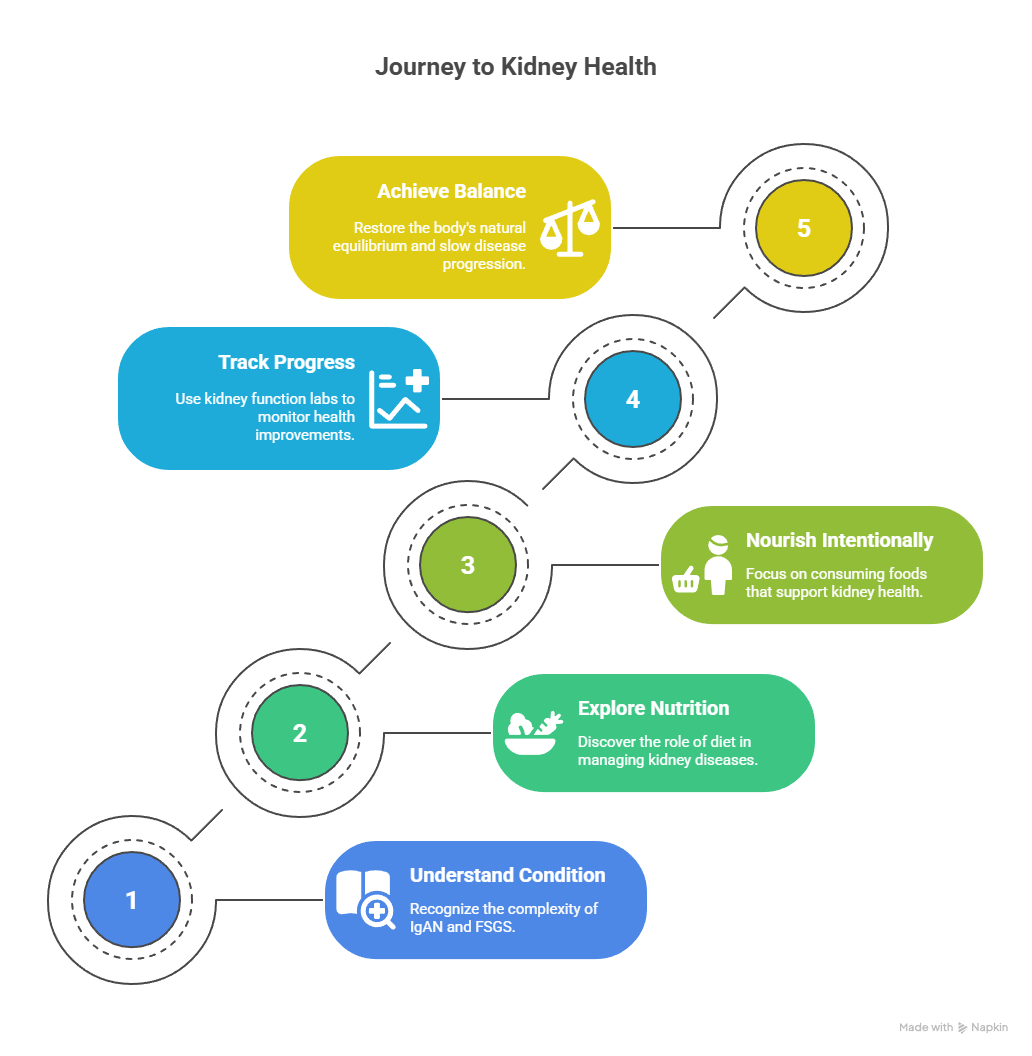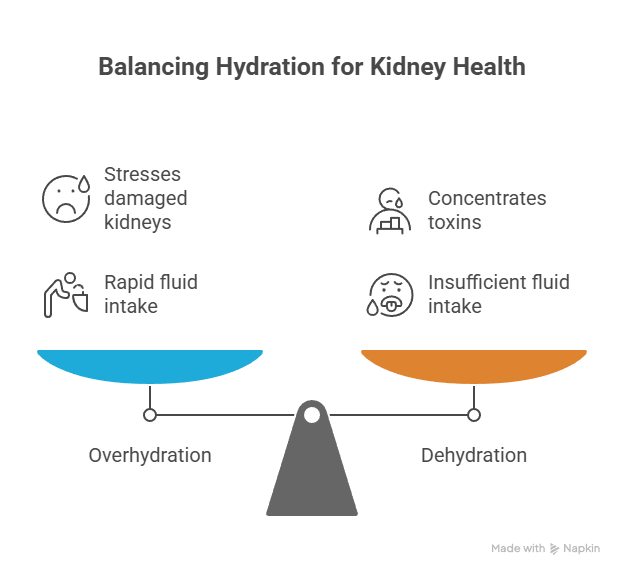
Introduction: Food as Medicine for Kidney Warriors
When you're living with a complex kidney condition like IgA Nephropathy (IgAN) or Focal Segmental Glomerulosclerosis (FSGS), it often feels like you’re navigating a maze with no clear map. Medications can help manage symptoms, but what about root cause healing? What about supporting your body’s innate ability to restore balance and slow disease progression?
In my practice as a functional nephrologist, I’ve seen firsthand the power of nutrition to shape outcomes, reduce inflammation, and empower patients to reclaim control over their health. Today, let’s unpack the transformative role diet plays in managing IgAN and FSGS, two glomerular diseases that are often considered progressive and difficult to treat with conventional approaches alone.
This is not just about what to avoid. It's about how you can nourish your body with intention, work in harmony with your biology, and become an active partner in your healing journey — all while tracking progress with tools like kidney function labs.
The Gut-Kidney Connection: The Starting Point of Systemic Inflammation
At the heart of both IgAN and FSGS lies one common enemy: chronic inflammation. Whether it originates in your immune system, your gut, or your diet, systemic inflammation damages the tiny blood vessels in your kidneys (glomeruli) over time.
Let’s begin with IgA Nephropathy, often called Berger’s disease. This condition involves an overproduction or dysfunctional form of the antibody immunoglobulin A (IgA), which gets deposited in the glomeruli and triggers immune responses. These repeated attacks cause scarring and gradual decline in kidney function.
But here’s what many overlook: A large percentage of our immune system resides in the gut. If your gut lining is compromised, due to gluten sensitivity, poor microbiome diversity, or inflammatory food choices, it can lead to increased intestinal permeability, commonly known as "leaky gut." This allows larger food particles, toxins, and immune triggers to enter the bloodstream, causing the immune system to misfire.
In people with IgAN, this immune miscommunication often centers around mucosal immunity and gut-associated lymphoid tissue (GALT). In simpler terms: if your gut is inflamed, your kidneys are at risk.
FSGS, though more structurally focused, shares similar immune and inflammatory roots. It involves scarring of segments of the glomeruli, often driven by metabolic stress, toxic exposure, high blood pressure, or immune dysregulation. And once again, the gut plays a silent but pivotal role.
Gluten and IgA Nephropathy: The Evidence for Elimination
For individuals with IgA Nephropathy, gluten can be more than a digestive irritant — it can act as a systemic trigger. Even in those without celiac disease, gluten may increase zonulin levels, a protein that controls gut permeability. Elevated zonulin contributes to a leaky gut, which can increase the absorption of immune-stimulating antigens, including gliadin (a gluten protein), potentially exacerbating IgA overproduction.
Many of my patients with IgAN experience measurable improvement in proteinuria, fatigue, and gut symptoms after eliminating gluten. While not everyone with IgAN is sensitive to gluten, exploring a 6- to 8-week elimination trial, under professional guidance, can be a powerful diagnostic tool and a gateway to improved gut-kidney harmony — something we often confirm through improvements in kidney function labs.
The Plant-Dominant, Low-Protein Strategy for FSGS
In FSGS, protein intake becomes a double-edged sword. Your body needs protein for repair and muscle health, but excessive amounts, especially from animal sources, can strain the kidneys, increase glomerular pressure, and worsen protein leakage in the urine.
Research and clinical experience support a moderate protein intake, typically around 0.6–0.8g/kg of body weight per day, with a significant portion from plant-based sources.
Why plant protein? Here’s what makes it unique:
- Lower acid load, which helps reduce kidney stress
- Rich in phytonutrients and anti-inflammatory compounds
- Naturally high in fiber, which promotes a healthy microbiome
- Slower absorption, easing post-meal blood sugar and insulin spikes
A well-formulated plant-dominant, low-protein diet doesn’t mean going vegan overnight. It means being intentional about:
- Replacing red meat and processed animal protein with lentils, tofu, tempeh, chia seeds, and organic soy
- Incorporating a wide variety of vegetables, berries, and healthy fats
- Ensuring meals are nutrient-dense and well-balanced
The Hidden Villains: Sodium, Phosphorus, and Processed Foods
Both IgAN and FSGS are influenced by more than just protein or gluten. The Western diet, rich in sodium, inorganic phosphorus additives, and ultra-processed foods, creates a pro-inflammatory state that accelerates kidney decline.
High sodium intake promotes fluid retention and raises blood pressure, further damaging already vulnerable kidneys. Excess phosphorus, particularly the kind added to processed foods and colas, disrupts mineral balance and promotes vascular calcification, increasing cardiovascular risks in kidney patients.
Value-driven dietary changes mean focusing on real, whole foods:
- Use herbs and spices instead of salt
- Limit packaged foods, even if labeled “healthy”
- Choose organic when possible to reduce pesticide exposure
- Read ingredient labels carefully for hidden phosphorus additives
When you feed your body clean, natural fuel, you reduce the toxic burden your kidneys must filter, freeing up energy for healing and regeneration.
Anti-Inflammatory Allies: The Food Pharmacy
Reducing inflammation doesn't always require prescriptions. Nature has equipped us with powerful, healing foods that can calm immune overactivity, reduce oxidative stress, and protect kidney cells from damage.
Consider making these staples in your weekly routine:
- Omega-3 rich foods: chia, flaxseed, walnuts, and low-mercury fish
- Colorful vegetables: spinach, beets, peppers, and cruciferous vegetables
- Berries: especially blueberries and blackberries, high in antioxidants
- Turmeric: contains curcumin, a potent anti-inflammatory agent
- Green tea: rich in catechins that protect glomeruli
When food becomes your medicine, your plate becomes a form of daily therapy.
Blood Sugar Control: A Shared Priority
Both IgAN and FSGS progression can be accelerated by poor blood sugar control, even in people without diabetes. Elevated glucose increases oxidative stress, impairs blood vessel health, and creates advanced glycation end-products (AGEs), which damage kidney tissue.
Building meals with low glycemic impact supports long-term kidney health:
- Combine protein, healthy fats, and fiber to slow sugar absorption
- Avoid sugary drinks and processed carbs
- Prioritize complex carbs like sweet potatoes, quinoa, and legumes
Mindful eating habits, such as chewing slowly, avoiding distractions while eating, and stopping before you're full, also help balance blood sugar naturally. Regular monitoring through kidney function labs ensures these dietary shifts are truly benefiting renal health.
Hydration and Kidney Protection
Hydration is essential, but in kidney disease, the “how” and “what” matters just as much as the “how much.” Overhydration can stress damaged kidneys, but chronic dehydration concentrates toxins and increases kidney workload.
General hydration values:
- Aim for clear or pale-yellow urine as a guide
- Sip water throughout the day rather than chugging large amounts at once
- Avoid soda, artificially sweetened drinks, and energy drinks
- Consider adding a pinch of sea salt or electrolyte drops if you’re on a low-sodium diet and feel fatigued
For those with advanced disease or on fluid restrictions, hydration needs must be individualized with your healthcare provider.

Mindset and Lifestyle: The Silent Drivers of Progress
Healing doesn’t happen through food alone. Your beliefs, your habits, your stress levels, and your environment all shape your health trajectory.
Chronic stress activates the hypothalamic-pituitary-adrenal (HPA) axis, elevating cortisol levels, raising blood pressure, and reducing blood flow to the kidneys. Trauma, anxiety, and even poor sleep can exacerbate inflammation and immune dysfunction.
Holistic strategies that support nervous system regulation include:
- Daily mindfulness or prayer
- Gentle movement like yoga or tai chi
- Breathwork and vagal nerve stimulation
- Cognitive behavioral therapy or somatic therapies for trauma
- Consistent sleep routine and exposure to morning light
In functional medicine, we treat the whole person, not just the disease. Diet is foundational, but mindset, rest, and emotional balance are just as vital. And yes — tracking improvements via kidney function labs can be a motivating part of this journey.
Real Stories, Real Hope
I’ve walked alongside patients with IgAN and FSGS who felt hopeless after years of decline and conflicting advice. When we focused on personalized nutrition, gut repair, stress reduction, and targeted supplementation, many found new energy, reduced proteinuria, stabilized creatinine levels, and regained a sense of control.
There’s no one-size-fits-all diet for kidney disease. But there is always hope in a plan that honors your body, listens to your unique needs, and supports healing from the inside out.
Final Thoughts: Empowerment Through Every Bite
Food is more than fuel — it's information for your cells, a message to your immune system, and a daily opportunity to choose healing over harm. Whether you're managing IgA Nephropathy or FSGS, the power of your plate is undeniable.
Start small. Replace one inflammatory habit with a nourishing one. Tune into how your body responds. Partner with a healthcare provider who sees you as a whole person and works with you to interpret your kidney function labs for deeper insight.
Healing may not be linear, but it is possible. And often, the most profound changes begin with what’s on your fork.
Special Offer: Take $50 off your first visit and discover how personalized, root-cause medicine can transform your health.
